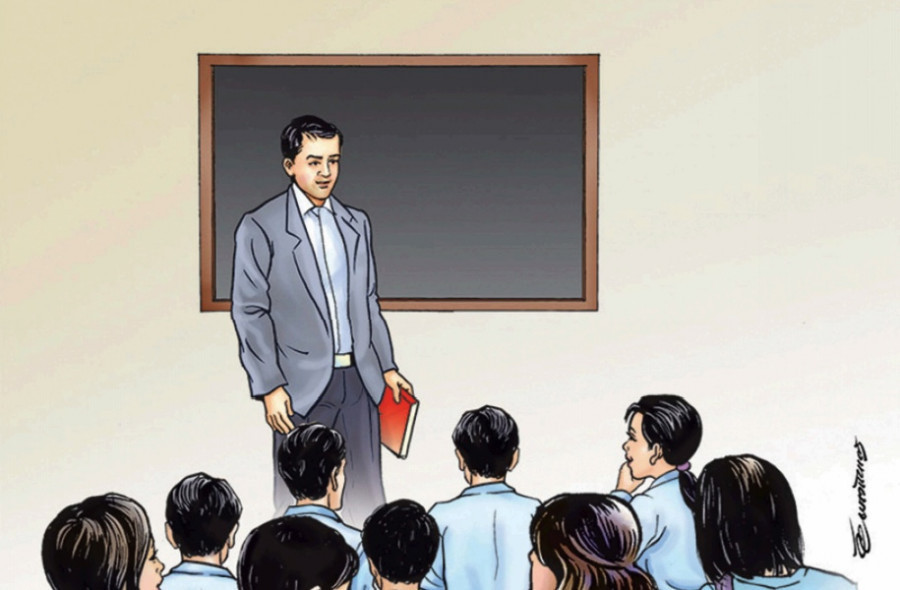Editorial
Teachers in politics
Most public school teachers in Nepal work with poor pay and perks, which makes them veer towards politics.
Schools and universities in Nepal have long grappled with the direct involvement of teachers and professors in politics, and the issue has now surfaced again. Following complaints that Tribhuvan University (TU) teachers were involved in politics—one as the coordinator of the Nepal Samajabadi Morcha and three as leaders of the Nepali Congress-affiliated Democratic Professors Association—the Election Commission has sought clarification from the TU administration and political parties.
In fact, a significant number of teachers are involved in political parties-affiliated teacher’s associations like the Nepal Teachers Association (Nepali Congress), the Nepal National Teachers Association (CPN-UML) and the Unified All Nepal Teachers Association (CPN-Maoist Centre). Even some representatives of the Congress and the UML parties in the 2021 general convention were reported to be school teachers. They made up over five percent of representatives in the Congress general convention the same year. Despite the Political Party Act, 2017 prohibiting political parties from enrolling in-service teachers and professors, and the Education Act restricting school teachers from holding political posts, teachers have openly engaged in political activities as cadres or election representatives, making the rules irrelevant.
While many teachers are occupied with politics, our universities and public schools are plagued by teacher absenteeism, delayed exams and results, academic year losses, and other issues that undermine the essence of education. Such affiliation also violates meritocracy in teachers’ appointments, as vice-chancellors and top executive officials in universities are political appointees. Educational institutions such as TU are deteriorating, and even Kathmandu University, which was previously free of political games, has suffered as a result.
We cannot deny that parties in Nepal have long been interested in having teachers as political activists. Nepali teachers were notably (and admirably) involved in the struggle to establish multiparty democracy, according to a paper commissioned by UNESCO for the 2017-18 Global Education Monitoring Report Accountability in Education: Meeting our Commitments. During the Maoist Conflict (1996-2006), many were also forced to financially support the insurgents. Teachers nowadays readily accept the roles assigned to them by political parties. The problem is no longer just of professional misconduct but also of the political culture that supports teachers’ involvement in politics. This is evident from Prime Minister Pushpa Kamal Dahal’s objection in 2021 to the Election Commission’s request that teachers refrain from participating in party politics, as such actions would “weaken party politics”.
The UNESCO-commissioned paper points to systemic problems as the primary reason for teachers’ involvement in politics. Most public school teachers in Nepal work in wretched conditions, with poor pay and perks. Because of this, they are likely to seek the help of political parties for their professional growth and development. In the face of politicisation of Nepal’s educational institutions, it is vital to make universities and schools more autonomous and apolitical by holding politically active teachers accountable. Last year, the Kathmandu Metropolitan City Mayor Balendra Shah asked teachers to renounce their political affiliations.
Addressing their needs, such as providing adequate resources, allowances, and opportunities could stop them from being lured by the undue privileges of party affiliation. Existing regulations should be strictly enforced, and the government should work to make educational institutions autonomous and independent. For instance, there is no reason the prime minister has to be the university chancellor or a political appointee the vice-chancellor. Unless such clear lines can be drawn and enforced, the clear divide between professionalism and politics will continue to blur, eviscerating our already ailing educational institutions.




 18.12°C Kathmandu
18.12°C Kathmandu














